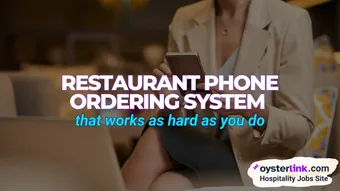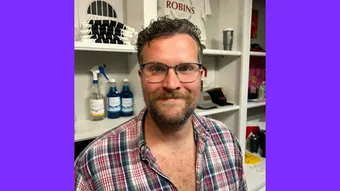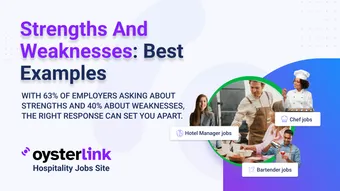Who is Kyle Inserra?
Kyle Inserra, as said in his own words, is a recovering restaurant owner. He spent over 20 years in the restaurant business, starting out as a Dishwasher when he was a teenager. His main reason back then was he wanted to have enough pocket money — but what he didn’t expect was to fall in love with the industry.
Kyle successfully graduated from a culinary school and came back to the industry as a Chef and restaurant owner. Now, he works for the industry but on the real estate side of things, where helps restaurant operators find great venues. He is also the host of a podcast called National Restaurant Owners Podcast.
From hiring to restaurant profitability
If you are thinking about starting a restaurant business or transferring from being a Chef to becoming an owner, this interview is the right read for you.
Today we sat down with Kyle Inserra, an industry veteran and the host of the National Restaurant Owner’s Podcast. We talked about all the important factors that will determine whether you will succeed or fail in the restaurant industry.
While this conversation is set to help the restaurant owners and operators, we touched on important employee perspectives such as career progression and timelines. The interview is packed with advice, so if you are ready to take the next step in your career you have come to the right plate.
Why did you decide to join the hospitality industry?
Kyle Inserra: My hospitality story started when I was quite young, back in the ninth or 10th grade. Nobody had money at that time except two of my friends. Every time we would go out, they had around $80. Back in the nineties that was a lot of money. Laughs.
One day I decided to ask them how they got the money. They said they worked in a new restaurant brewery. I immediately wanted to be a part of the gang, so I asked them to help me get hired there.
Despite my grandfather being a restaurant owner, having this first job experience was my introduction to the restaurant culture.
I was so energized by the people that were surrounding me. So yes, I entered the industry because I wanted to earn some money but ended up loving it.
How important is having a culinary degree for a Chef?
Kyle: Both my parents worked in high education, so they wanted me to go the corporate route. Finish school, get a safe job, get your pension, get your benefits, retire and enjoy — but that didn't work for me.
I wanted to pursue a career in the restaurant industry, so I went to culinary school after I got my first four-year degree.
Is culinary school really necessary? I'll tell you what — I wouldn't trade that experience for the world. I would go back to culinary school tomorrow.
Yes, you learn more working in the field, but I think that the time in school helps you go through the process of what’s right and what’s wrong. It teaches you about different cuisines, cultures and things of that nature.
School gives you a nice base heading into a career in the hospitality business.
How can young people get mentors?
Kyle: That's a great question because having the right mentors is so important to your career.
I would say start in your hometown, or somewhere that you're familiar with. Start with a restaurant where you just like the food. A place that is up your alley, you like the taste, presentation, the restaurant itself or the dining experience.
Find a place you can connect with, and [there] you will find a mentor.
If you are starting out just speak to somebody there, or if you are already working there make your ambition known! The management needs to know where you want to be, regardless of the direction.
The biggest problem in this line of work is people are not forthcoming with their ambitions.
Ask and you shall receive. Sometimes you just end up not receiving what you want because you didn’t speak up. Just open your mouth and let them know. People are keen on helping others in our industry.
What are the best and the worst parts of being a Chef?
Kyle: The best part for me was creating food and making people happy. That’s a part of who I am. Hospitality comes very naturally to me because I am a giving person.
I loved the immediate gratification. You make this delicious food, and you look out of the kitchen window, and you see that guests are enjoying it. It’s one of the best feelings in the world.
The worst part is all the sacrifices you have to make to build a career. All of the long hours, the working weekends and holidays. It’s something you can’t avoid if you want to be in the hospitality industry.
You must find ways to enjoy your time. A lot of people get distracted while building a culinary career. There is a lot of late-night drinking, going out with team members and friends.
How can one shift their mindset from being a Chef to being an owner?
Kyle: You have to keep that flame lit! You need to keep that passion up every day, while holding onto creativity as well.
You need to know who you are!
The biggest shift for me was the sense of emptiness. I missed being in the kitchen, hauling things around, standing in the cold walk-in, putting things away. But I knew my goal was to be on the operator side, so I managed to overcome these challenges.
You got into the business because you have a passion for cooking, creating and providing an experience. And then suddenly, you need to ensure you are hitting your P&L, your payroll is not getting excessive, you are paying vendors on time, and taking care of taxes.
You don’t get trained for any of these while in culinary school. So, you learn while you do it. Your responsibilities are taken to another level when you shift from Chef to owner.
The biggest misconception is that folks who have been in the restaurant business for over 10 years think they are ready to own a restaurant. That is a huge leap and it’s not easy. A completely different set of skills will be required, and it will take time to get them dialed in.
How can one master a new skill set the easy way?
Kyle: I think the best thing to master the new skill set is by doing all the work. Just jump right into it, tackle payroll, invoicing, taxes — everything.
The pushback for most Chefs will be from their own minds. They will start thinking they are not good at this or that, and that they are meant to be creating dishes and providing experiences.
The best way to get a head start during this transition is to find something you are good at and focus on that. Focus on the one thing you are good at and hire people for the things you are not good at.
There is no universal remedy for everyone because all of us are good in different areas. Someone is good with scheduling; another person is good with numbers. Whatever it is you are good at, take charge of it and start learning about other areas from the professionals you will hire.
You're not looking to recreate the wheel; you're looking to get a base understanding and then do it your way. Focus on what you can control, what you like to do and then outsource for the rest.
Don’t be shy to ask for help. Talk to people in the industry, people who have been through it, they will provide insights. Find podcasts like this one, like my podcast are great resources. You just need to find them.
What are the biggest challenges restaurant operators are facing currently?
Kyle: The bottom line of all the challenges is profitability. Operators are struggling with making money.
[But] for some reason, it's not okay for restaurants to talk about making money, right?
The situation is worse when it comes to independent restaurants. Not that the chains are not facing the same challenges, but they openly talk about money problems.
Profitability encompasses everything from rent to minimum wage and the cost of goods. It seems like challenges are coming from all angles, but as hard as it may be you, as an operator, have to look at each one of those things as an opportunity for your business.
Your payroll is too high, how can you make it leaner? The cost of goods is too high, you need to take a good look at your menu. Do you really need everything that's there?
[If the] rent is too high, can you talk to your landlord? Can you look at a smaller space? There are ways to make this work. Are you doing the best in marketing? Are you driving the best sales? Can we improve there?
Because frankly, [as much as] I love the restaurant business and I hope this doesn't upset anybody, but the complaining is not going to get you anywhere!
Complaining and feeling sorry for yourself won’t turn your business around. You have to acknowledge what your problems are and then fix them, change course — whatever you have to do.
But complaining about how you can't hire somebody? We got to figure out a new way to make it work.
And I think the good operators, that's exactly what they're doing. They observe this period as an opportunity to grow their concept rather than sit and wallow about how bad things are.
How important is the location of a restaurant for its success?
Kyle: I love that question because it's so timely for right now. When it comes to real estate and restaurants there are two very distinct options.
You can have a fantastic location with high visibility but pay high rent [prices]. Or you can have something off the beaten path with a lower rent and spend more money on marketing.
That is really dependent on the concept because I think so many restaurants realize now, post-COVID, that they don't need to be in the high-rent area. They can be off the side street, doing 80% takeout and making just as much money. Some operators choose to pay less rent.
Do what makes sense. If you are paying [in rent] more than 10% of your gross sales every year, you are on a death spiral.
You will face a yearly rent increase of 2% to 3%. So how will you keep up with that? You will have to increase your prices by 3% to 5% every year, and you can’t do that because of your customers. You have to be smart!
Start making smart decisions and look at it from a long-term perspective. Figure out what will work best for your particular concept.
What are some of your tips when it comes to hiring?
Kyle: One of the mistakes that I definitely made, and a lot of operators make is relying heavily on the person’s past experiences.
A lot of times we see your resume and see where you have worked before and for how long. But in reality, what does this data tell us? The only thing we can see is that you know how to hold a job.
There are plenty of people who have had a job for a long period of time who are not great at what they do. So, we should always focus on personality when hiring, especially in the hospitality industry!
The personality, energy and vibe that I get from somebody is everything that I look for. They don’t necessarily have to have restaurant experience. They can have experience in retail or any other job, if they have the right personality they will be hired.
The front of the house is the best PR machine you could have. So, lead with that. If they are energetic and have people skills your customers will be happy. I am pretty sure you know that happy customers mean more money.
I would ask them if they were interested in working in the restaurant business because those people are the front-of-house staff anyway, are the front lines of your business, right? They're your best PR machine. And if they're the best, if you're hiring the best — meaning, the best in terms of best fit for your brand — then that gives a good look for your company internally, like, Wow, they have a great energetic vibe. I want to go work with them.
That also goes down to the staff. I mean, it also goes down to the customers. When the customers are happy, then they're more likely to keep coming back.
This is not an easy thing to do, but you need to figure out how to hire.
What is a realistic timeline for career progression in hospitality?
Kyle: That's a tough question. Have goals and a timeline set in your head. For example, your goal can be: I want to be the General Manager in two years.
Set your little goals all along the way, [and] talk to people about what your goal is. That's a big thing. We touched on it earlier, but talking to other people, talking about [your goals] out loud will help you make it happen. You never know who's listening and who's going to give you a shot.
Putting too much emphasis on where you want to be without that plan is what leads to a lot of frustration. Because if you don't put a plan on it, you will get easily distracted.
Having a goal is a good way to start. Understand where you are and where you want to go. Have conversations with people who can help you get where you want to be.
Focus on these things and you will be able to create your own timeline.
What is the one thing you wish you knew before you joined the industry?
Kyle: I wish I didn't spend so much time measuring my success against somebody else's.
It's easy to look at the guy down the road and say, Oh their place is full every night, they are so lucky. [But what] you don’t know is that they have been around for 25 years. It might be realistic to compare your performance against their performance in the first year, but not in their 10th or so.
Instead of comparing their success [with where you are right now], go and talk to the person. Ask them about the market, the customers, what has helped them. That’s the best conversation you can have because they will talk from experience.
The things they would share now are not the same things they would have said when starting out. So don’t make assumptions about anybody else.
Just stay focused on what your concept is and how to make your business profitable. Don’t waste your time and energy on something useless like comparison.
Focus on your concept and success will follow
Building a hospitality career, much like building a successful restaurant business, brings a lot of distractions and challenges along the way.
In today’s conversation, we have learned that the most important factor is focusing on your goals instead of distractions. Whether you want to be a Hotel Manager within two years or you want to expand your establishment's operation — cancel out the noise, focus on your concept and success will follow.






Loading comments...